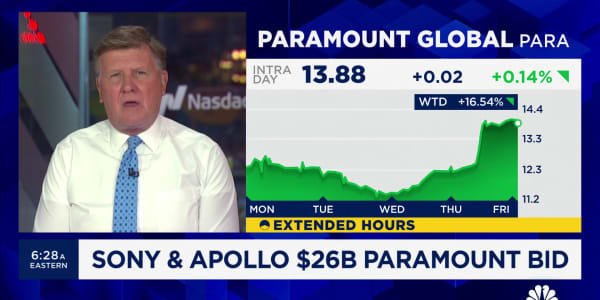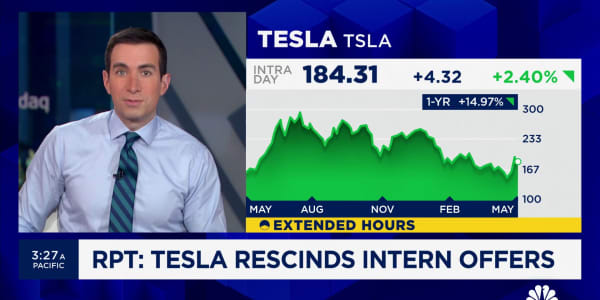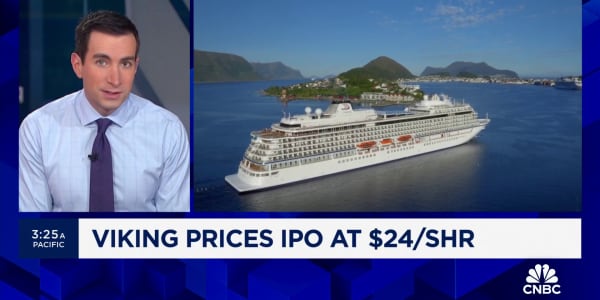The best (and worst) of this week in the markets
Certain logistics companies may not have delivered gifts on time this Christmas, but we're on time with Executive Edge's weekly market winners and losers.
There has been some good news for some big tech names as the year draws to a close, and not just in terms of holiday sales, but in stock market fortunes that have rebounded, or continue to defy expectations. The never-ending battle between market doom and gloom and the indefatigable bulls was evident in the best and worst of the economic data this past week. And, finally, we felt compelled to warn buyers about a big-ticket, cutting-edge ride that is losing its charge, in more ways than one.
Loser: UPS
United Parcel Service, suffering through a big public relations with holiday shipments that failed to reach clients in time for Christmas, may have jets to blame in part for the woes, according to The Wall Street Journal.
The newspaper Friday that the unexpected boom in last-minute packages "swamped the company's air fleet," created by a smaller number of cargo planes, according to sources within the industry.
The Journal added that although UPS always has a war-games-style preparation for the peak Christmas season, a combination of factors caught the giant carrier by surprise. These included a surge in online purchases encouraged by retailers, as well as "just-in-time" delivery promises made by certain merchants.
Winner: Apple
Apple shares rose after the firm a new iPhone distribution deal with China Mobile. But some analysts warned investors not to expect a dramatic jump in sales in China like Apple recently enjoyed in Japan.
In Japan, competition between service providers makes the iPhones virtually free to consumers. This is not so in China. Also, Chinese phone manufacturers sell Android phones that are much cheaper than iPhones. There's no doubt, though, that better access to Chinese consumers is good for Apple in the long run, assuming Chinese incomes rise.
"The [Chinese] market is actually much smaller than that 750 million [population] figure. It's an important deal but let's not get carried away."—Alastair Newton, senior political analyst at Nomura
Loser: McDonald's
Remember the advice on tipping and budgeting that McDonald's offered up to its employees earlier this year?
McDonald's employee resources website is giving out even more for workers. This time, it's about the industry it helped make ubiquitous—fast food.
"Fast foods are quick, reasonably priced, and readily available alternatives to home cooking. While convenient and economical for a busy lifestyle, fast foods are typically high in calories, fat, saturated fat, sugar, and salt and may put people at risk for becoming overweight," reads one post on the site, which includes a picture of a hamburger and fries, two items that the fast-food giant specializes in selling.
Another post labels a meal with a cheeseburger and fries as the "unhealthy choice" and one with a submarine sandwich and salad as the "healthier choice," noting that it's more of a challenge to eat healthy when visiting a fast-food place.
McDonald's defended the posting in a statement issued Monday afternoon.
"Portions of this website continue to be taken entirely out of context," McDonald's statement said. "This website provides useful information from respected third-parties about many topics, among them health and wellness. It also includes information from experts about healthy eating and making balanced choices. McDonald's agrees with this advice."
Winner: Amazon
Amazon is no Blackberry—everything's going gangbusters. But experts are just how long the stock can keep going up absent bigger profits. The retailer's shares are now trading above $400, for a 12-month gain of more than 57 percent.
The problem is, Amazon earns just 28 cents a share, for a price-to-earnings ratio of more than 1,400. That's nearly 1,000 times the S&P 500's long-term average of around 15. So to get to "normal," the share price has to fall or earnings have to rise. By a lot.
The company's admirers point out that CEO Jeff Bezos' heavy emphasis on pouring revenue into growth causes the low reported earnings, and that Bezos can quickly allow earnings to soar once he's satisfied Amazon has become the world's dominant retailer. Some say a better gauge of Amazon is the price-to-sales ratio, which is not nearly as outlandish. But anyone who lived through the dot-com bubble knows the danger of thinking traditional gauges like profits don't matter.
"The company has gone through a major investment cycle before. And what the market has essentially done is said: 'Instead of waiting, I'm going to buy it on faith.'"—Mark Mahaney of RBC Capital Markets
Loser: BlackBerry
Some investors are buying into the vision of new CEO John Chen—a tech turnaround expert from his Sybase days—but BlackBerry skeptics continue to work on a first draft of the tech company's obituary. What the epitaph should say, essentially, is that BlackBerry erred in tying its brand too closely to its device.
The struggling firm recently reported a monumental $4.4 billion third-quarter write-down for unsold inventory, as the devices have lost appeal. It is trying to save itself with less emphasis on the devices themselves and more on the software and services, like messaging, that the firm offers corporate and government clients.
But once-loyal corporate IT departments are looking elsewhere. Once they move to other firms' devices, like those from Apple and Samsung, they may not see much reason to stick with services and software from BlackBerry, even if they're perfectly sound. After these customers are lost, they'll be tough to get back.
"The [BlackBerry] device was the hook and they were supplying everything else. But if I don't want the device anymore, then I move on all together and I get tools that are designed for the new device."—Carolina Milanesi, a technology analyst
Winner: Oklahoma gas guzzlers
Oklahoma's a nice state, though no one would move there just because gasoline prices are low. But seeing why those prices are the lowest in the nation offers some into the forces that drive this market. Oklahoma gas prices average $2.84 a gallon. After hitting a low of $3.20 last month, the national average has been rising.
Oklahomans benefit from being close to crude oil sources and refineries, while residents of many other states have one or the other, or neither. Also, Oklahoma's crude is of a generally less expensive type than that used elsewhere. Finally, the state charges a gas tax of only 17 cents a gallon, less than half the national average.
Loser: The bears
Worries that Fed tapering would undermine stocks seem to be unfounded, and the wealth effect from stock gains could help drive the economy. Not many are projecting stupendous growth next year, but a GDP gain of 2.6 to 3 percent looks quite possible.
Meanwhile, this year has been a terrific year for stock market investors and anyone who worries about inflation, but it hasn't been so kind to those who need a growing economy to boost sales or create a job. So how are things shaping up for 2014? The point to steady growth, according to some top economists.
Personal spending and consumption, which picked up nicely in October and November, could do even better in December, and then gather steam as the labor market improves next year.
"You're already starting to see GDP growth. You're already starting to see better data, and it's all because of the labor market. When the labor market starts to pick up we're going to start to see better consumer data."—UBS' U.S. economist Kevin Cummings
"We still have some pent up demand there among consumers for housing and automobiles. That still has to be exhausted. I think we'll do better on that front."—Moody's Capital Market's Chief Economist John Lonski
Winner: 2014 stock investors (already?)
Past performance is no guarantee of future results, as investors have been told over and over. Still, it would be silly not to at least consider lessons from history, and past patterns suggest the odds favor good stock-market gains in 2014.
There have been 17 years since 1950 when the S&P 500 finished up more than 20 percent. In 14 of those occasions, or 82 percent, stocks racked up further gains the following year. In 12 of those 14 occasions, the S&P gained at least 7 percent. The average year-after gain was 11.27 percent, and the median 12.78 percent.
Those figures pale next to the S&P's 28 percent gain so far this year, but returns like that would be pretty good given that in recent years many experts have warned that stock gains might average in the low- to mid-single digits for years to come.
Loser: Electric car owners
Owning an electric car might make you the coolest kid on the block, but expect to pay a premium—twice.
Most car owners know that the various types of electric cars, from hybrids to pure electrics, sell for more than the same or similar model with a gasoline-only engine. But now it looks like electric vehicles depreciate faster as well.
A done for USA Today by Kelley Blue Book shows, for instance, that the best-selling pure-electric, the Leaf, will hold on to just 15 percent of its original value after five years. A similar Nissan Sentra SL compact would retain 36 percent of its value. Residual values of the Focus Electric and Spark EV are also likely to fall short of their all-gas counterparts. Plug-in hybrids, which have gasoline backup engines, do much better.
The study doesn't suggest there's really anything wrong with the all-electrics, just that used-car buyers take awhile to get comfortable with new technologies.
"We expect to see a similar adoption curve for used EVs as we have for new EVs, and we are just now reaching the point where there are used EVs on the market."—Erik Gottfried, director of marketing for Nissan Leaf
Winner or loser (you decide!): Twitter
S&P Capital IQ analyst Analyst Scott Kessler still can't find the value in , and reiterated his sell rating on Friday. Macquarie joined Kessler, downgrading Twitter to a sell on Friday. Shares slumped by 13 percent.
Still, the red-hot social media stock has shot up 40 percent since Dec. 11, making it one of the best-performing newly public stocks this year and granting it a larger market capitalization than most of the S&P index.
It all comes down to value and earnings for Kessler, who has held a "sell" rating on Twitter since November.
"At the end of the day, we have thought and we continue to think the valuation is just initially stretched. It's excessive. It appears now that we've approached some kind of mania. When that happens, you just kind of have to wait and see what happens."—Kessler speaking on CNBC's Squawk Box




